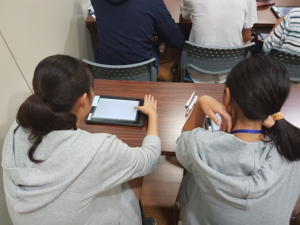Yoshi Okamoto
 Shonan Seminar (SHO-zemi), Japan’s fastest-growing education group, is pleased to initiate a joint learning science research initiative with Tel Aviv University’s Minducate Center in the Sagol School of Neuroscience. This collaboration leverages a compelling research environment of over 200 centers enrolling over 30,000 students at SHO-zemi. The goal is to enhance Professor Lilach Shalev’s successful research into ways we can assess and even improve student attention and executive function. A critical aspect of this collaboration is a focus on practical and scalable outcomes that can impact students’ academic performance and empower teachers, even after the research is completed.
Shonan Seminar (SHO-zemi), Japan’s fastest-growing education group, is pleased to initiate a joint learning science research initiative with Tel Aviv University’s Minducate Center in the Sagol School of Neuroscience. This collaboration leverages a compelling research environment of over 200 centers enrolling over 30,000 students at SHO-zemi. The goal is to enhance Professor Lilach Shalev’s successful research into ways we can assess and even improve student attention and executive function. A critical aspect of this collaboration is a focus on practical and scalable outcomes that can impact students’ academic performance and empower teachers, even after the research is completed.
 Yoshi Okamoto of SHO-zemi met Professor Shalev after they were both invited to speak at the prestigious Israel EdTech Summit 2017 in June. Mr. Okamoto had already been pursuing methods to understand students’ cognitive and emotional function in classrooms, so when he saw that another speaker was running an “Attention Lab” at Tel Aviv University, he was intrigued to find a potential colleague who was working towards similar goals. Upon their first meeting, Professor Shalev’s feedback helped refine Mr. Okamoto’s existing ideas, and he immediately wanted to support her work. Over the summer of 2017, SHO-zemi invited Professor Shalev to experience an intensive four-day summer seminar. The seminar was an opportunity to experience SHO-zemi’s teaching methods first-hand while also participating in ongoing “learning engineering” approaches that enable rich data collection at scale using commodity tablets and video cameras. Professor Shalev’s curiosity and enthusiasm led to a quick decision on her part to enable this exchange. This productive visit sparked further discussion, not only with Mr. Okamoto, but also with other SHO-zemi teachers, leaders, and researchers.
Yoshi Okamoto of SHO-zemi met Professor Shalev after they were both invited to speak at the prestigious Israel EdTech Summit 2017 in June. Mr. Okamoto had already been pursuing methods to understand students’ cognitive and emotional function in classrooms, so when he saw that another speaker was running an “Attention Lab” at Tel Aviv University, he was intrigued to find a potential colleague who was working towards similar goals. Upon their first meeting, Professor Shalev’s feedback helped refine Mr. Okamoto’s existing ideas, and he immediately wanted to support her work. Over the summer of 2017, SHO-zemi invited Professor Shalev to experience an intensive four-day summer seminar. The seminar was an opportunity to experience SHO-zemi’s teaching methods first-hand while also participating in ongoing “learning engineering” approaches that enable rich data collection at scale using commodity tablets and video cameras. Professor Shalev’s curiosity and enthusiasm led to a quick decision on her part to enable this exchange. This productive visit sparked further discussion, not only with Mr. Okamoto, but also with other SHO-zemi teachers, leaders, and researchers.
SHO-zemi is excited to develop research around the theme of sustained attention and cognitive control, and pilot data collection and analysis. SHO-zemi’s agile learning engineering platform together with the deep expertise of Professor Shalev’s attention lab is a powerful combination. These efforts stand to improve the way students learn across cultures and throughout their lifespans.
Dr. Elana Zion Golumbic
The goal of the project is to study the ability to synchronize motor actions to external rhythms and to test implications on attentional performance. We also study individual differences in rhythmic preferences. We use the Auditory CPT test, developed by Shalev-Mevorach et al. to classify participants into groups based on their different attentional abilities.
Boaz M. Ben-David, Ph.D
In our study, we tested the link between the perception of emotions in speech and performance on the evaluative tools developed by Shalev Mevorach and colleges. First, we found that when no selective attention is called for, the performance of student with ADHD did not differ than the performance of the control group. Second, the prosodic dominance in speech perception, a benchmark of speech perception, was not evident for students with ADHD. Whereas the control group only showed failures of selective attention when asked to ignore the prosody, the ADHD group showed similar failures when asked to inhibit the prosody and when asked to inhibit the semantics. Importantly, when asked to rate the emotion of the uttarance as a whole, processing both semantics and prosody, the preference for the prosodic information evident for control participants, was missing completely for students with ADHD. Finally, our data can provide an external support to Shalev-Mevorach’s tools, showcasing that reduced performance on the computerized visual tasks can externalize to performance in the auditory domain with emotional speech stimuli.
Prof. Nachshon Meiran
We use Shalev et al.’s version of the continuous performance task in a large-scale project conducted in the IDF. In this project we incorporate a battery of tests tapping the three major domains of executive functions (working-memory, shifting and inhibition) as well the Shalev’s task.
